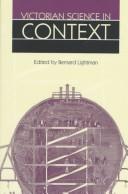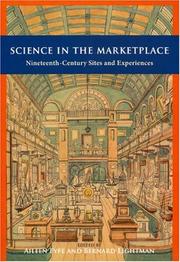| Listing 1 - 9 of 9 |
Sort by
|
Book
ISBN: 1421431408 1421430304 1421431416 Year: 2019 Publisher: Johns Hopkins University Press
Abstract | Keywords | Export | Availability | Bookmark
 Loading...
Loading...Choose an application
- Reference Manager
- EndNote
- RefWorks (Direct export to RefWorks)
Originally published in 1987. The Origins of Agnosticism provides a reinterpretation of agnosticism and its relationship to science. Professor Lightman examines the epistemological basis of agnostics' learned ignorance, studying their core claim that "God is unknowable." To address this question, he reconstructs the theory of knowledge posited by Thomas Henry Huxley and his network of agnostics. In doing so, Lightman argues that agnosticism was constructed on an epistemological foundation laid by Christian thought. In addition to undermining the continuity in the intellectual history of religious thought, Lightman exposes the religious origins of agnosticism.
Agnosticism --- History --- Great Britain --- Intellectual life --- Atheism --- Belief and doubt --- Faith --- Free thought --- Skepticism --- European history
Book
ISBN: 9789004263994 9789004264007 9004264000 9004263993 Year: 2015 Publisher: Boston
Abstract | Keywords | Export | Availability | Bookmark
 Loading...
Loading...Choose an application
- Reference Manager
- EndNote
- RefWorks (Direct export to RefWorks)
Today the name most closely associated with evolutionary theory is Charles Darwin. Given Darwin’s immense reputation it is easy to forget that Herbert Spencer, in his time, was just as famous as Darwin. It turns out that Spencer’s evolutionary thought was not what necessarily appealed to many of his readers, since they had their own sense of his identity and importance. By focusing on Spencer the evolutionist, scholars have tended to concentrate their attention on a rather narrow view of him that has come out of Anglo-American appropriations of his thought. Spencer was one of the first international, public intellectuals whose views on psychology, religion, sociology, ethics, education, and biology captured the imagination of readers all over the world. The chapters will cover the communication and appropriation of Spencer’s ideas in Russia, the Middle East, China, Japan, Mexico, Argentina, Brazil, the United States, Italy, Scandinavia, and France. Contributors are: Li Bin, Juan Manuel Rodriguez Caso, Gowan Dawson, Heloisa Maria Bertol Domingues, Marwa Elshakry, Mark Francis, G. Clinton Godart, Michael Gordon, Paola Govoni, Rosaura Ruiz Gutiérrez, Hans Henrik Hjermitslev, Ricardo Noguera-Solano, Adriana Novoa, Greg Radick, Nathalie Richard, Ke Zunke.
Evolution. --- Philosophy --- Creation --- Emergence (Philosophy) --- Teleology --- Spencer, Herbert,
Book
ISBN: 9780822945741 9780822987048 082298704X Year: 2019 Publisher: Pittsburgh
Abstract | Keywords | Export | Availability | Bookmark
 Loading...
Loading...Choose an application
- Reference Manager
- EndNote
- RefWorks (Direct export to RefWorks)
The historical interface between science and religion was depicted as an unbridgeable conflict in the last quarter of the nineteenth century. Starting in the 1970s, such a conception was too simplistic and not at all accurate when considering the totality of that relationship. This volume evaluates the utility of the "complexity principle" in past, present, and future scholarship. First put forward by historian John Brooke over twenty-five years ago, the complexity principle rejects the idea of a single thesis of conflict or harmony, or integration or separation, between science and religion. Rethinking History, Science, and Religion brings together an interdisciplinary group of scholars at the forefront of their fields to consider whether new approaches to the study of science and culture-such as recent developments in research on science and the history of publishing, the global history of science, the geographical examination of space and place, and science and media-have cast doubt on the complexity thesis, or if it remains a serviceable historiographical model. --
Religion and science --- History --- History.

ISBN: 1283058391 9786613058393 0226481107 9780226481104 9781283058391 6613058394 0226481115 9780226481111 0226481123 9780226481128 Year: 1997 Publisher: Chicago, Ill. University of Chicago Press
Abstract | Keywords | Export | Availability | Bookmark
 Loading...
Loading...Choose an application
- Reference Manager
- EndNote
- RefWorks (Direct export to RefWorks)
Victorians were fascinated by the flood of strange new worlds that science was opening to them. Exotic plants and animals poured into London from all corners of the Empire, while revolutionary theories such as the radical idea that humans might be descended from apes drew crowds to heated debates. Men and women of all social classes avidly collected scientific specimens for display in their homes and devoured literature about science and its practitioners. Victorian Science in Context captures the essence of this fascination, charting the many ways in which science influenced and was influenced by the larger Victorian culture. Contributions from leading scholars in history, literature, and the history of science explore questions such as: What did science mean to the Victorians? For whom was Victorian science written? What ideological messages did it convey? The contributors show how practical concerns interacted with contextual issues to mold Victorian science-which in turn shaped much of the relationship between modern science and culture.
Science --- History --- Great Britain --- Social conditions --- victorianism, victorian period, science, scientific studies, scientists, humanities, fascination, engagement, cultural study, culture, ideology, ideological approach, great britain, british history, historical contexts, 19th century, social conditions, knowledge, economics, biology, biological, politics, political, charles darwin, evolution, darwinism, satire, literature, race, fiction, literary, representation, working environments, zoology, empire, colonialism.

ISBN: 022615002X 9780226150024 9780226276502 0226276503 Year: 2007 Publisher: Chicago
Abstract | Keywords | Export | Availability | Bookmark
 Loading...
Loading...Choose an application
- Reference Manager
- EndNote
- RefWorks (Direct export to RefWorks)
The nineteenth century was an age of transformation in science, when scientists were rewarded for their startling new discoveries with increased social status and authority. But it was also a time when ordinary people from across the social spectrum were given the opportunity to participate in science, for education, entertainment, or both. In Victorian Britain science could be encountered in myriad forms and in countless locations: in panoramic shows, exhibitions, and galleries; in city museums and country houses; in popular lectures; and even in domestic conversations that revolved around t
Science --- Science museums --- Science centers --- Museums --- Natural science --- Natural sciences --- Science of science --- Sciences --- Social aspects --- History --- Great Britain --- Intellectual life --- 19th century, history, historical, humanities, science, transformation, change, scientists, marketplace, social status, authority, discovery, education, entertainment, victorian period, britain, british, panoramic shows, exhibitions, galleries, museums, lectures, cultural studies, culture, popular sciences, common points of discussion, phrenology, popularity, natural, nature, electricity, anatomy, demonstrations.
Book
ISBN: 9004251413 9789004251410 9004244417 9789004244412 9789004244412 1299690904 Year: 2013 Publisher: Leiden BRILL
Abstract | Keywords | Export | Availability | Bookmark
 Loading...
Loading...Choose an application
- Reference Manager
- EndNote
- RefWorks (Direct export to RefWorks)
In The Circulation of Knowledge Between Britain, India and China , twelve scholars examine how knowledge, things and people moved within, and between, the East and the West from the early modern period to the twentieth century. The collection starts by looking at the ways and means that knowledge circulated, first in Europe, but then beyond to India and China. It engages the knowledge and encounters of those Europeans as they moved across the globe. It participates in the attempt to open up more nuanced and balanced trajectories of colonial and post-colonial encounters. By focusing on exchange, translation, and resistance, the authors bring into the spotlight many 'bit-players' and things originally relegated to the margins in the development of late modern science. Contributors include Karen Smith, Larry Stewart, Savrithri Preetha Nair, Jan Golinski, Arun Bala, Jonathan Topham, Khyati Nagar, Yang Haiyan, Fa-ti Fan, Grace Yen Shen, Jahnavi Phalkey, Veena Rao, and Sundar Sarukkai.
Communication in science --- Discoveries in science --- Enlightenment. --- Knowledge, Sociology of. --- Science --- Natural science --- Natural sciences --- Science of science --- Sciences --- Knowledge, Theory of (Sociology) --- Sociology of knowledge --- Communication --- Knowledge, Theory of --- Public opinion --- Sociology --- Social epistemology --- Communication in research --- Science communication --- Science information --- Scientific communications --- Aufklärung --- Eighteenth century --- Philosophy, Modern --- Rationalism --- History.
Book
ISBN: 9780822946281 0822946289 9780822987697 0822987694 Year: 2020 Publisher: Pittsburgh, PA
Abstract | Keywords | Export | Availability | Bookmark
 Loading...
Loading...Choose an application
- Reference Manager
- EndNote
- RefWorks (Direct export to RefWorks)
"Although historians have suggested for some time that we move away from the assumption of a necessary clash between science and religion, the conflict narrative persists in contemporary discourse. But why? And how do we really know what people actually think about evolutionary science, let alone the many and varied ways in which it might relate to individual belief? In this multidisciplinary volume, experts in history and philosophy of science, oral history, sociology of religion, social psychology, and science communication and public engagement look beyond two warring systems of thought. They consider a far more complex, multifaceted, and distinctly more interesting picture of how differing groups along a spectrum of worldviews-including atheistic, agnostic, and faith groups-relate to and form the ongoing narrative of a necessary clash between evolution and faith. By ascribing agency to the public, from the nineteenth century to the present and across Canada and the United Kingdom, this volume offers a much more nuanced analysis of people's perceptions about the relationship between evolutionary science, religion, and personal belief, one that better elucidates the complexities not only of that relationship but of actual lived experience"--
Religion and science --- Evolution (Biology) --- Faith --- Experience (Religion) --- Religious aspects --- Religion and science.
Book
ISBN: 0822981645 1315654172 1317318285 9781306397735 1306397731 9781781440858 1781440859 9781781444078 1781444072 9780822981640 9781848934634 1848934637 9781315654171 9781317318286 Year: 2014 Publisher: London Brookfield, Vermont
Abstract | Keywords | Export | Availability | Bookmark
 Loading...
Loading...Choose an application
- Reference Manager
- EndNote
- RefWorks (Direct export to RefWorks)
The essays in this volume focus on the way Victorian Physicist John Tyndall and his correspondents developed their ideas through letters, periodicals and journals and challenge assumptions about who gained authority, and how they attained and defended their position within the scientific community.
Science --- Naturalism --- History --- Religious aspects. --- Philosophy --- Tyndall, John, --- Influence. --- 1800-1899 --- Great Britain --- Great Britain.
Book
ISBN: 0822987694 Year: 2020 Publisher: Pittsburgh, Pennsylvania : University of Minnesota Press,
Abstract | Keywords | Export | Availability | Bookmark
 Loading...
Loading...Choose an application
- Reference Manager
- EndNote
- RefWorks (Direct export to RefWorks)
"Although historians have suggested for some time that we move away from the assumption of a necessary clash between science and religion, the conflict narrative persists in contemporary discourse. But why? And how do we really know what people actually think about evolutionary science, let alone the many and varied ways in which it might relate to individual belief? In this multidisciplinary volume, experts in history and philosophy of science, oral history, sociology of religion, social psychology, and science communication and public engagement look beyond two warring systems of thought. They consider a far more complex, multifaceted, and distinctly more interesting picture of how differing groups along a spectrum of worldviews-including atheistic, agnostic, and faith groups-relate to and form the ongoing narrative of a necessary clash between evolution and faith. By ascribing agency to the public, from the nineteenth century to the present and across Canada and the United Kingdom, this volume offers a much more nuanced analysis of people's perceptions about the relationship between evolutionary science, religion, and personal belief, one that better elucidates the complexities not only of that relationship but of actual lived experience"--
| Listing 1 - 9 of 9 |
Sort by
|

 Search
Search Feedback
Feedback About UniCat
About UniCat  Help
Help News
News